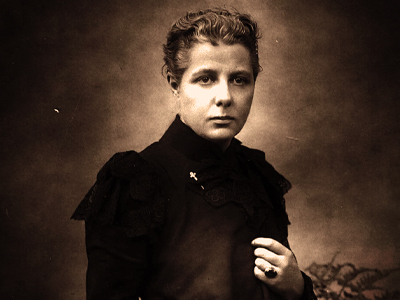
Annie Besant
Annie Besant born in London in 1847, daughter of William Page Wood and Emily Morris, was three-fourths Irish. She had an excellent childhood education in literature and languages. Her tutor was a devout Christian, and young Annie, imbibing her influence, developed a passion for the Church.
At age twenty, she married the Reverend Frank Besant. She had a son, Digby, and a daughter, Mabel. When her baby daughter suffered a long and painful illness, Mrs. Besant began to doubt the goodness of a God who could inflict such a fate upon an innocent child. She sought answers in religious literature, and from reading Eastern teachings, she learned that Jesus was not the only incarnation of Deity. From this disillusionment she felt she could no longer take communion. Combined with increasing estrangement from her domineering husband, brought to a climax when he commanded her to take communion or leave his home, she chose freedom. She obtained legal separation in 1873 and was given custody of her daughter.
She continued her studies of religious subjects, only now from the standpoint of free thought. In 1874 she heard Charles Bradlaugh lecture and was inspired to join his organization. She later became co-editor of his atheistic journal, National Reformer. She began to speak and write in support of his campaign for election to Parliament, and then for his right to take his seat, contested every time because of his atheism.
Always Annie Besant’s sympathetic nature led her to work for alleviation of suffering among the poor. She and Bradlaugh published and distributed a pamphlet on birth control, for which they were arrested, tried, fined, and sentenced to 6 months imprisonment. Through appeals they were eventually acquitted. This experience heightened Annie’s social consciousness, and in 1885 she resigned from Bradlaugh’s organization and joined the socialist Fabian Society.
Because of the adverse publicity resulting from the birth control pamphlet, Annie was legally deprived of custody of her daughter, as sought by Rev. Besant. However, as soon as both children came of age, they left their father and returned to their mother.
With the socialist Fabian Society, Annie Besant worked, wrote, and spoke for reform in taxation, Irish home rule, repeal of capital punishment, fair labor law as, national education and many other issues. During this time when higher education for women was unpopular, she studied at London University and received advanced certificates in eight sciences. In 1887, she was elected to the London School Board serving for 3 years at which time she declined reelection.
She collaborated with W.T. Stead in publishing a small paper, The Link, designed to bring labor groups together. Stead occasionally gave her books to review for his Review of Reviews. In 1889.
